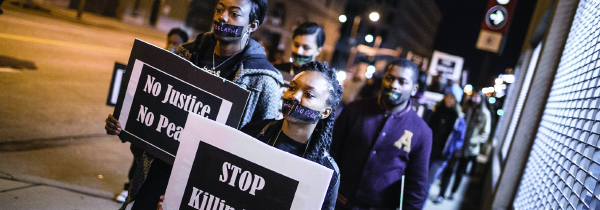 |
 |
||||||||||||||

Talking About Race
A Tufts-wide forum looks at the causes and consequences of inequality
Tufts moved the post-Ferguson conversation on racial injustice a step forward in late February when it held a university-wide Forum on Race, Inequality, and Action. Sponsored by the Office of the Provost and the Center for the Study of Race and Democracy, in collaboration with the Jonathan M. Tisch College of Citizenship and Public Service, the forum brought together faculty panelists from diverse fields.
Provost David Harris opened the proceedings. He pointed out similarities between the 1991 Rodney King case, in which Los Angeles police were videotaped beating an unarmed black man, and the case of Eric Garner, whom New York City police placed in a fatal chokehold, an event likewise caught on video. In both cases, Harris said, different groups of Americans viewed the videos and came to starkly different conclusions. Universities, he said, can help put those reactions into historical context and can advocate for social and political change.
Peniel Joseph, a professor of history and director of the Center for the Study of Race and Democracy, observed that some Americans enjoy more rights than others—a condition he termed “the new Jim Crow.” In the end, he urged the audience to understand that “it’s not just why black lives matter, it’s why all lives matter.”
Assistant professor of history Kendra Field spoke about her forebears in the post–Civil War South. During Reconstruction, she said, the freedom of former slaves proved illusory, as they were “economically bound to the land.” Her ancestors took part in a quiet exodus from the Deep South in the late 1800s. Latinos have their own story, said Helen Marrow, an assistant professor of sociology who focuses on immigration issues. She spoke of “the racialization, criminalization, and demonization” of immigrant Latino men. “Deportation is profitable,” she remarked, pointing to the privately owned prisons filled with immigrants, the majority not charged with any criminal offense.
During the second half of the program, Pearl Robinson, an associate professor of political science, discussed her research on the African American Nobel Peace Prize recipient Ralph Bunche. She was followed by Heather Curtis, an associate professor of religion, who discussed the role of certain U.S. religious traditions in promoting white privilege, both during and after slavery. Finally, Joyce Sackey, dean for multicultural affairs and global health at the School of Medicine and associate professor of public health and community medicine, underscored the inequities between the health of blacks and whites in America, especially when it comes to infant mortality and preterm births.
The forum’s organizers hoped to bring the national dialogue on race down to the local and personal level. Sackey viewed the event as an “opportunity to examine our own biases and ask if we are doing everything we can do to create an inclusive community, not only at Tufts, but in any community where we find ourselves.”
For Simon Howard, a Ph.D. candidate in psychology who helped plan the forum, the intent was as much about deeds as thoughts. By illuminating the history and social science behind racial discrimination, he said, the forum was a chance to inspire “people who are on the cusp of becoming activists.”